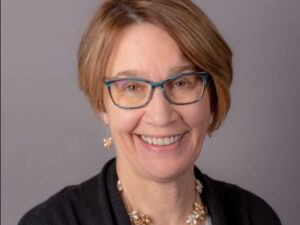“Life starts all over again when it gets crisp in the fall.”
F. Scott Fitzgerald
It is September and we are starting our inaugural NOSM University class of the MD program, the Dietetics Internship program and the Masters in Medical Studies program. This summer, academic and business continuity were maintained, our postgraduate programs started July 1 and we were busy focussing on work to ensure the ongoing prosperity of our relationships with Lakehead University and Laurentian University. I have been in Thunder Bay for several weeks now and am loving the lake, the people and our commitment to the Northwest. I am meeting with so many people whom I haven’t seen for months and greeting NOSM University’s new learners. September marks the end of a beautiful summer for most of us, though the weather is still brilliant. I always see the beginning of fall after Labour Day as a milestone. It is a fresh start for many reasons; a new class begins, cooler nights, the smell of moth balls as I bring out my sweaters and the colours of the trees as they start to turn. And as the wheel of time turns, we see that NOSM University is growing and making history.
Medical school is one of the most exhaustive educational paths and for the first time in their lives, many students find themselves struggling academically. I remember my first day at McMaster and how many of us felt unprepared for the journey into a professional program like medicine. I was sure my admission was an administrative mistake and waited for someone to tell me it was an error. So far, no one has mentioned it (30 years later).
The ever-changing and demanding field of medicine requires the life of a student, resident and practising physician to be adaptable and dynamic. Today more than ever, students and physicians must learn to balance their careers and personal life while still finding time for their own health and wellness. I have some advice for our new learners:
1) Establish a strong and reliable peer support group. Your educational experience at NOSM University is uniquely grounded in the realities of community-based health care. It is extraordinary, engaging but also demanding. Your peers will be empathetic and able to commiserate with you during challenging times. Be there for each other.
2) Use deductive reasoning. The volume of information can be daunting but remember you don’t have to remember everything. Develop life-long learning skills and know when you can problem solve and use deductive reasoning. These skills will do more for you than trying to regurgitate what you hear in class or read in a book.
3) Take small sips. Do not try to drink from a full-on fire hose. At NOSM University, we value critical thinking and knowledge application. Yes, there is a lot of learning, but eventually it will all make sense when you start to see patients.
Our third class of Master of Medical Studies this year includes three international medical graduates with research interests in rural medicine, mental health, addiction, virtual medicine and multidisciplinary medical education. Designed for physicians wanting to complement their clinical practice with research these students will immerse themselves in a research project that answers questions which have an impact on Northern and rural communities.
Our 16th class of the Northern Ontario Dietetic Internship Program (NODIP) has also just started. The program is a comprehensive 46-week program in which students learn about nutrition care, population and public health, and management roles in dietetics. Twelve soon-to-be Registered Dietitians will be learning from dedicated preceptors across the region.
What’s new with NOSM U?
We are underway with our search for our first Chancellor. We have closed the applications for the rest of our new Board of Governors and the two advisory committees for these tasks are hard at work. We are awaiting the outcome of the CCAA proceedings for Laurentian University and are hoping to have the $14.6 million dollars in endowments secured as well as working with Lakehead University to settle the transfer of the endowments located there. We have signed a five-year agreement to continue our research grant administration and animal care facilities at Lakehead and are working on a similar agreement with Laurentian. And we are still discussing the outcome of the buildings on each campus occupied by NOSM University. We continue to be confident these matters will result in better relationships with Laurentian and Lakehead and we aim to build new and improved relationships with new colleges and universities in Canada and around the world.
Many firsts in history paved the way for astounding changes that revolutionised the world, like the first vaccine, the first flights, and the creation of the internet. We are making firsts at NOSM University with our first Chancellor, our first Board of Governors, our first Convocation as a University. This is just the beginning. As a famous Canadian politician once said: “Just watch me.” We will keep making firsts at NOSM University. Stay tuned – there is a lot of history in the making coming our way.
Miigwetch, thank you, marsi, merci,
Dr. Sarita Verma
President, Vice Chancellor, Dean and CEO
NOSM University
If you have any feedback or comments, please reach out at president@nosm.caand follow me on Twitter @ddsv3.

Celebrating Franco-Ontarian Day
NOSM University is proud to celebrate Franco-Ontarian Day!
September 25 is THE day to highlight Franco-Ontarians in the community and to participate in the numerous celebrations in the region. This day is first and foremost the anniversary of the raising of the Franco-Ontarian flag which occurred for the first time on September 25, 1975 at the University of Sudbury.
Find out more information on this very important day for the Franco-Ontarian community as well as other related information here.
For people in Thunder Bay, enjoy the festivities on September 9 and 10 by participating in the 10th edition of the Franco Festival de Thunder Bay! The program details are available here.
You may also wish to attend the flag raising at City Hall on Friday, September 23 at 11 AM (information available here).
For people in Sudbury, the traditional flag raising, a collaborative presentation by the ACFO du grand Sudbury and the University of Sudbury, will be held on Sunday, September 25 at 10:30 AM at the University of Sudbury (in person and by Facebook Live). You can find more information here.
You can also attend other flag raising in a number of communities across northern Ontario. Please consult the community’s Website for detailed information (dates and times will vary).

NOSM University events to acknowledge the
National Day for Truth and Reconciliation on September 30th
The federal government passed legislation to make September 30 a federal statutory holiday called the National Day for Truth and Reconciliation. An important step in the reconciliation process, this day provides an opportunity to recognize and commemorate the tragic history and ongoing legacy of residential schools, and to honour survivors, their families and communities. Even though the National Day for Truth and Reconciliation is not a statutory holiday in Ontario nor at NOSM University, there will be events in the coming weeks and on September 30th lead by the Indigenous Affairs Unit and knowledge keepers.
Among many resources, please consider completing the Hearing Our Voices – Indigenous Cultural Safety Training Program. For physicians, this Program is now fully accredited (RCPSC Section 3 – 15 hours) and CFPC Mainpro+ 3:1 – 45 hours). The Registration fee for NOSM University Physician Faculty is $275, Healthcare Professionals $150, NOSM University Staff $150, and Learners $125.
 After six years as Associate Dean Postgraduate Education and five years as Vice Dean Academic, Dr. Catherine Cervin has announced her intention to retire from NOSM University on December 31, 2022. Dr. Cervin has a long history of service to Northern Ontario and to NOSM University. She has led systemic change, managed complex portfolios and has been a champion for social justice and family medicine. Please join me in thanking Dr. Cervin for all of her amazing contributions to NOSM University over the last 11 years.
After six years as Associate Dean Postgraduate Education and five years as Vice Dean Academic, Dr. Catherine Cervin has announced her intention to retire from NOSM University on December 31, 2022. Dr. Cervin has a long history of service to Northern Ontario and to NOSM University. She has led systemic change, managed complex portfolios and has been a champion for social justice and family medicine. Please join me in thanking Dr. Cervin for all of her amazing contributions to NOSM University over the last 11 years.
 Students, please note:
Students, please note:
The office of the President, Vice Chancellor, Dean and CEO will be hosting a pub night meet and greet on September 13 at Tony and Adam’s in Thunder Bay from from 6:30 p.m. to 8:30 p.m. Keep your eye out for a formal invitation.


